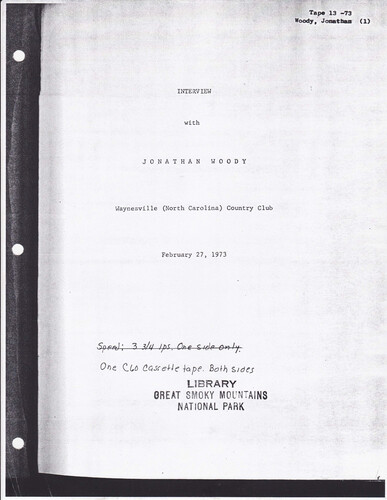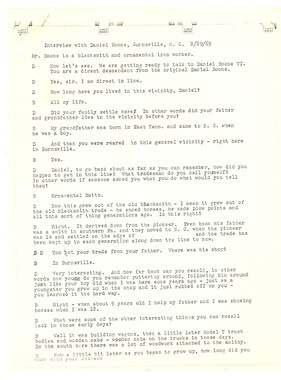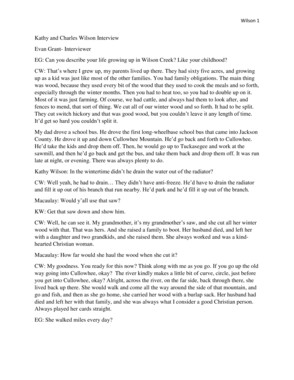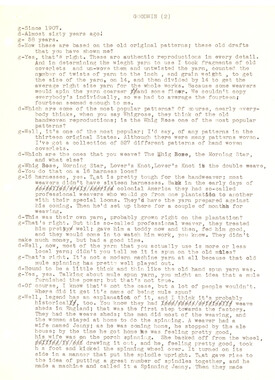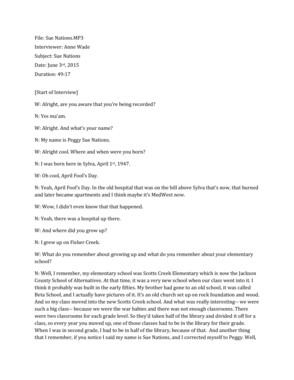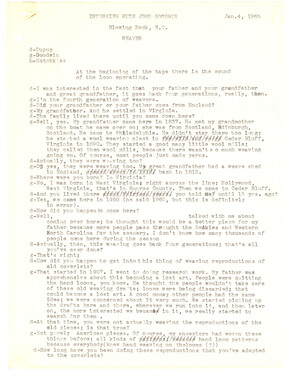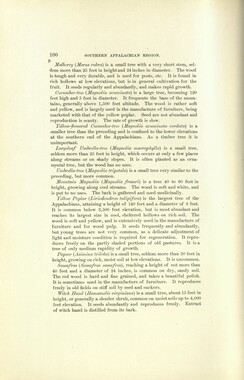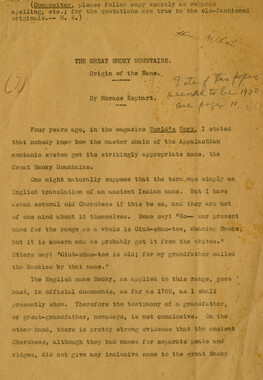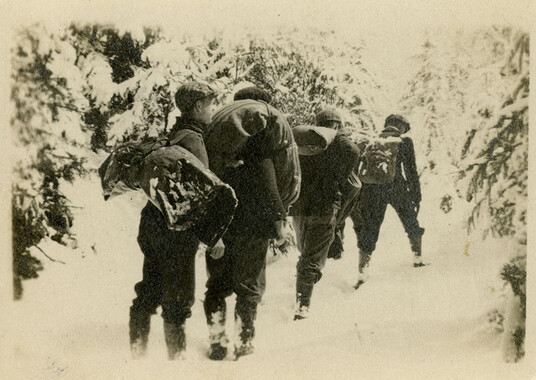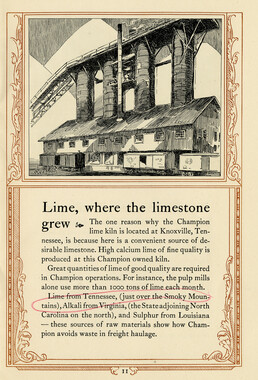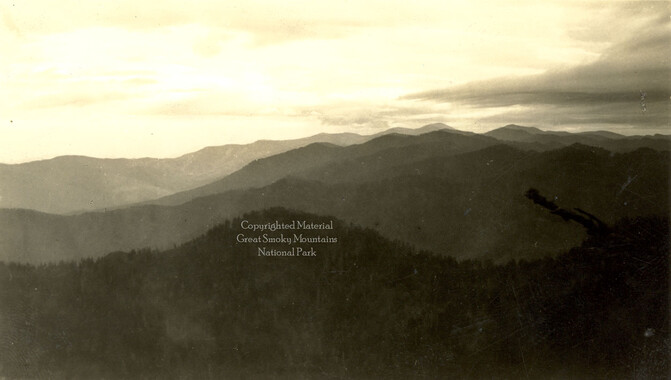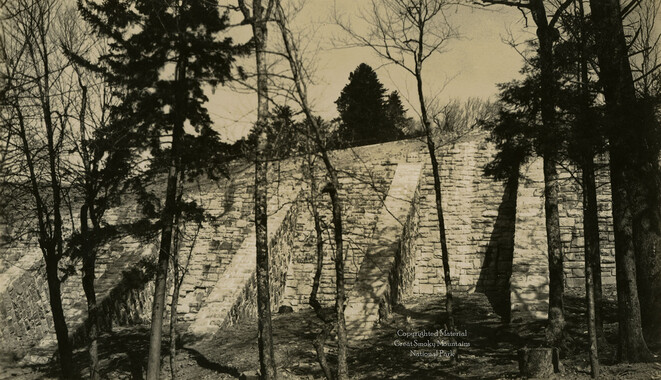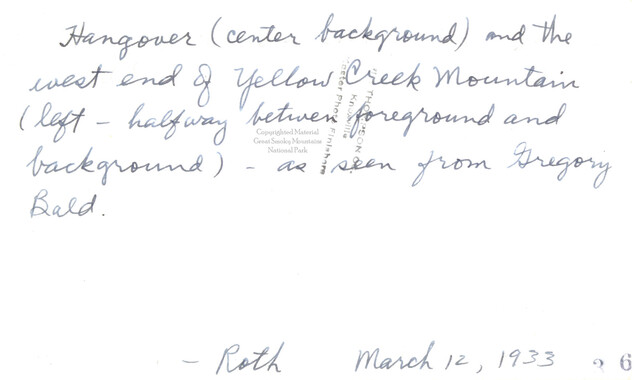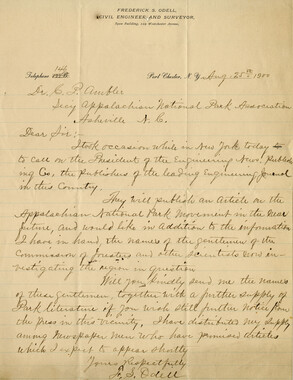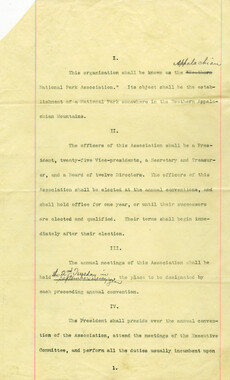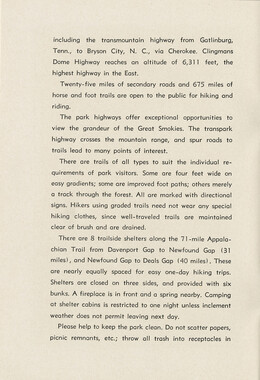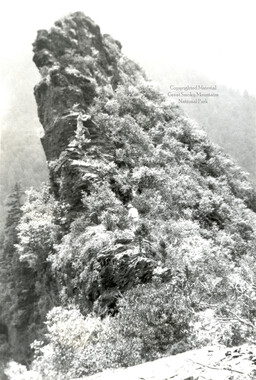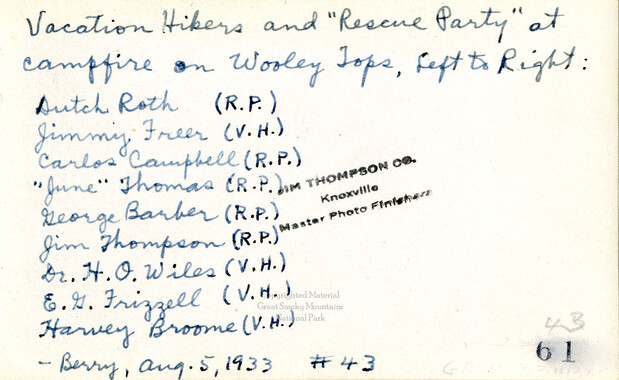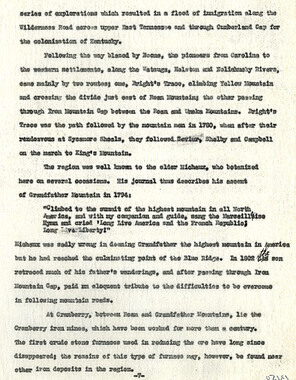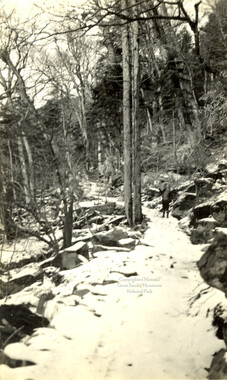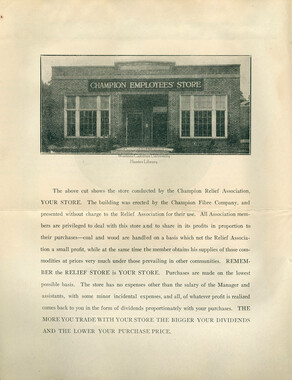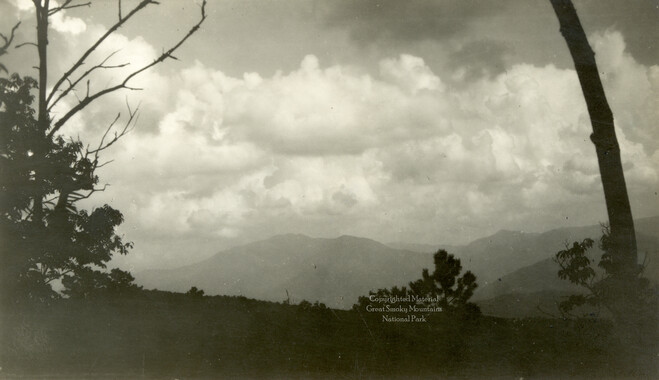Western Carolina University (8)
View all
- Cherokee Traditions (12)
- Civil War in Southern Appalachia (1)
- Craft Revival (18)
- Great Smoky Mountains - A Park for America (46)
- LGBTQIA+ Archive of Jackson County (5)
- Oral Histories of Western North Carolina (299)
- Picturing Appalachia (5)
- Western Carolina University: Making Memories (4)
- Canton Champion Fibre Company (0)
- Highlights from Western Carolina University (0)
- Horace Kephart (0)
- Journeys Through Jackson (0)
- Stories of Mountain Folk (0)
- Travel Western North Carolina (0)
- Western Carolina University Fine Art Museum Vitreograph Collection (0)
- Western Carolina University Herbarium (0)
- Western Carolina University Publications (0)
- Western Carolina University Restricted Electronic Theses and Dissertations (0)
- Western North Carolina Regional Maps (0)
- World War II in Southern Appalachia (0)
University of North Carolina Asheville (0)
View all
- Faces of Asheville (0)
- Forestry in Western North Carolina (0)
- Grove Park Inn Photograph Collection (0)
- Isaiah Rice Photograph Collection (0)
- Morse Family Chimney Rock Park Collection (0)
- Picturing Asheville and Western North Carolina (0)
- Appalachian National Park Association (3)
- Southern Highland Handicraft Guild (5)
- Western Carolina University. Mountain Heritage Center (12)
- Allanstand Cottage Industries (0)
- Bennett, Kelly, 1890-1974 (0)
- Berry, Walter (0)
- Brasstown Carvers (0)
- Cain, Doreyl Ammons (0)
- Carver, George Washington, 1864?-1943 (0)
- Cathey, Joseph, 1803-1874 (0)
- Champion Fibre Company (0)
- Champion Paper and Fibre Company (0)
- Cherokee Indian Fair Association (0)
- Cherokee Language Program (0)
- Crittenden, Lorraine (0)
- Crowe, Amanda (0)
- Edmonston, Thomas Benton, 1842-1907 (0)
- Ensley, A. L. (Abraham Lincoln), 1865-1948 (0)
- Fromer, Irving Rhodes, 1913-1994 (0)
- George Butz (BFS 1907) (0)
- Goodrich, Frances Louisa (0)
- Grant, George Alexander, 1891-1964 (0)
- Heard, Marian Gladys (0)
- Kephart, Calvin, 1883-1969 (0)
- Kephart, Horace, 1862-1931 (0)
- Kephart, Laura, 1862-1954 (0)
- Laney, Gideon Thomas, 1889-1976 (0)
- Masa, George, 1881-1933 (0)
- McElhinney, William Julian, 1896-1953 (0)
- Niggli, Josephina, 1910-1983 (0)
- North Carolina Park Commission (0)
- Osborne, Kezia Stradley (0)
- Owens, Samuel Robert, 1918-1995 (0)
- Penland Weavers and Potters (0)
- Rhodes, Judy (0)
- Roberts, Vivienne (0)
- Roth, Albert, 1890-1974 (0)
- Schenck, Carl Alwin, 1868-1955 (0)
- Sherrill's Photography Studio (0)
- Smith, Edward Clark (0)
- Southern Highlanders, Inc. (0)
- Stalcup, Jesse Bryson (0)
- Stearns, I. K. (0)
- Thompson, James Edward, 1880-1976 (0)
- United States. Indian Arts and Crafts Board (0)
- USFS (0)
- Vance, Zebulon Baird, 1830-1894 (0)
- Weaver, Zebulon, 1872-1948 (0)
- Western Carolina College (0)
- Western Carolina Teachers College (0)
- Western Carolina University (0)
- Whitman, Walt, 1819-1892 (0)
- Wilburn, Hiram Coleman, 1880-1967 (0)
- Williams, Isadora (0)
- 1700s (1)
- 1830s (1)
- 1840s (1)
- 1850s (1)
- 1860s (1)
- 1890s (2)
- 1900s (31)
- 1910s (3)
- 1920s (6)
- 1930s (9)
- 1940s (17)
- 1950s (25)
- 1960s (52)
- 1970s (45)
- 1980s (34)
- 1990s (23)
- 2000s (38)
- 2010s (61)
- 2020s (21)
- 1600s (0)
- 1800s (0)
- 1810s (0)
- 1820s (0)
- 1870s (0)
- 1880s (0)
- Appalachian Region, Southern (44)
- Asheville (N.C.) (9)
- Avery County (N.C.) (1)
- Buncombe County (N.C.) (56)
- Cherokee County (N.C.) (15)
- Clay County (N.C.) (4)
- Graham County (N.C.) (15)
- Great Smoky Mountains National Park (N.C. and Tenn.) (2)
- Haywood County (N.C.) (54)
- Henderson County (N.C.) (5)
- Jackson County (N.C.) (166)
- Knox County (Tenn.) (1)
- Macon County (N.C.) (16)
- Madison County (N.C.) (5)
- McDowell County (N.C.) (1)
- Mitchell County (N.C.) (5)
- Polk County (N.C.) (3)
- Qualla Boundary (20)
- Rutherford County (N.C.) (1)
- Swain County (N.C.) (29)
- Watauga County (N.C.) (3)
- Waynesville (N.C.) (1)
- Yancey County (N.C.) (3)
- Blount County (Tenn.) (0)
- Knoxville (Tenn.) (0)
- Lake Santeetlah (N.C.) (0)
- Transylvania County (N.C.) (0)
- Aerial Photographs (3)
- Aerial Views (60)
- Albums (books) (4)
- Articles (1)
- Artifacts (object Genre) (228)
- Biography (general Genre) (2)
- Cards (information Artifacts) (38)
- Clippings (information Artifacts) (191)
- Crafts (art Genres) (622)
- Depictions (visual Works) (21)
- Design Drawings (1)
- Drawings (visual Works) (184)
- Envelopes (73)
- Facsimiles (reproductions) (1)
- Fiction (general Genre) (4)
- Financial Records (12)
- Fliers (printed Matter) (67)
- Glass Plate Negatives (381)
- Guidebooks (2)
- Internegatives (10)
- Interviews (811)
- Land Surveys (102)
- Letters (correspondence) (1013)
- Manuscripts (documents) (619)
- Maps (documents) (159)
- Memorandums (25)
- Minutes (administrative Records) (59)
- Negatives (photographs) (5735)
- Newsletters (1285)
- Newspapers (2)
- Occupation Currency (1)
- Paintings (visual Works) (1)
- Pen And Ink Drawings (1)
- Periodicals (193)
- Personal Narratives (7)
- Photographs (12982)
- Plans (maps) (1)
- Poetry (5)
- Portraits (1657)
- Postcards (329)
- Programs (documents) (151)
- Publications (documents) (2237)
- Questionnaires (65)
- Scrapbooks (282)
- Sheet Music (1)
- Slides (photographs) (402)
- Sound Recordings (796)
- Specimens (92)
- Speeches (documents) (15)
- Tintypes (photographs) (8)
- Transcripts (322)
- Video Recordings (physical Artifacts) (23)
- Vitreographs (129)
- Text Messages (0)
- Appalachian National Park Association Records (21)
- Cataloochee History Project (10)
- George Masa Collection (4)
- Horace Kephart Collection (3)
- Love Family Papers (1)
- Qualla Arts and Crafts Mutual Collection (12)
- WCU Gender and Sexuality Oral History Project (32)
- WCU Mountain Heritage Center Oral Histories (20)
- WCU Oral History Collection - Mountain People, Mountain Lives (71)
- Western North Carolina Tomorrow Black Oral History Project (66)
- A.L. Ensley Collection (0)
- Appalachian Industrial School Records (0)
- Axley-Meroney Collection (0)
- Bayard Wootten Photograph Collection (0)
- Bethel Rural Community Organization Collection (0)
- Blumer Collection (0)
- C.W. Slagle Collection (0)
- Canton Area Historical Museum (0)
- Carlos C. Campbell Collection (0)
- Cherokee Studies Collection (0)
- Daisy Dame Photograph Album (0)
- Daniel Boone VI Collection (0)
- Doris Ulmann Photograph Collection (0)
- Elizabeth H. Lasley Collection (0)
- Elizabeth Woolworth Szold Fleharty Collection (0)
- Frank Fry Collection (0)
- Gideon Laney Collection (0)
- Hazel Scarborough Collection (0)
- Hiram C. Wilburn Papers (0)
- Historic Photographs Collection (0)
- Humbard Collection (0)
- Hunter and Weaver Families Collection (0)
- I. D. Blumenthal Collection (0)
- Isadora Williams Collection (0)
- Jesse Bryson Stalcup Collection (0)
- Jim Thompson Collection (0)
- John B. Battle Collection (0)
- John C. Campbell Folk School Records (0)
- John Parris Collection (0)
- Judaculla Rock project (0)
- Kelly Bennett Collection (0)
- Major Wiley Parris Civil War Letters (0)
- Map Collection (0)
- McFee-Misemer Civil War Letters (0)
- Mountain Heritage Center Collection (0)
- Norburn - Robertson - Thomson Families Collection (0)
- Pauline Hood Collection (0)
- Pre-Guild Collection (0)
- R.A. Romanes Collection (0)
- Rosser H. Taylor Collection (0)
- Samuel Robert Owens Collection (0)
- Sara Madison Collection (0)
- Sherrill Studio Photo Collection (0)
- Smoky Mountains Hiking Club Collection (0)
- Stories of Mountain Folk - Radio Programs (0)
- The Reporter, Western Carolina University (0)
- Venoy and Elizabeth Reed Collection (0)
- WCU Students Newspapers Collection (0)
- William Williams Stringfield Collection (0)
- Zebulon Weaver Collection (0)
- African Americans (94)
- Artisans (19)
- Cherokee art (9)
- Cherokee artists -- North Carolina (10)
- Cherokee language (1)
- Cherokee pottery (3)
- Cherokee women (4)
- Church buildings (1)
- College student newspapers and periodicals (2)
- Education (3)
- Floods (14)
- Folk music (3)
- Forest conservation (1)
- Forests and forestry (2)
- Gender nonconformity (4)
- Great Smoky Mountains National Park (N.C. and Tenn.) (5)
- Hunting (1)
- Maps (1)
- Mines and mineral resources (2)
- Rural electrification -- North Carolina, Western (2)
- School integration -- Southern States (2)
- Segregation -- North Carolina, Western (5)
- Slavery (4)
- Sports (2)
- Storytelling (4)
- Weaving -- Appalachian Region, Southern (3)
- Wood-carving -- Appalachian Region, Southern (3)
- World War, 1939-1945 (3)
- Appalachian Trail (0)
- Civilian Conservation Corps (U.S.) (0)
- Dams (0)
- Dance (0)
- Forced removal, 1813-1903 (0)
- Landscape photography (0)
- Logging (0)
- North Carolina -- Maps (0)
- Paper industry (0)
- Postcards (0)
- Pottery (0)
- Railroad trains (0)
- Waterfalls -- Great Smoky Mountains (N.C. and Tenn.) (0)
Interview with Jonathan Woody about life in Cataloochee
Item
Item’s are ‘child’ level descriptions to ‘parent’ objects, (e.g. one page of a whole book).
-
-
INTERVIEW with J 0 N A T H A N W 0 0 D Y Waynesville (North Carolina) Country Club February 27, 1973 5pf'l"d; 3 W /Jf. QJI e & tdP On 1'/. Ohe ((;o C.asre.J-Je +ape. Bof}) S;de_s LIBRARY GREAT SM OKY MOUNTAINS NATIONAL PARK .... ·'"-'" ·'---- - .,.,, ....•. , . Tape 13 -73 W~octy; J onatbalr -(1) No part of this manuscript may be quoted for publication except by written permission of the Superintendent of the Great Smoky Mountains National Park. ~-.J Material indented . ten spaces., is that of the other interviewer • . , .. _.,.- :.'[,.:·:,. ... Note however that the interviewers I voices sounded quite similar and it was difficult to distinguish between them. It is believed that a distinction has been made in the transcription although the remarks of the interviewers may be reversed in tbe transcription. s has been taken off on a Wollensak 3M 6020 Tape Recorder. The counter numbers /000/ in the body of the text indicate that the recording The counter index numbers (000) in the margin are is has been transcribed verbatim et literatim as nearly as possible. has been no editing whatsoever. Attempt has been made to put on the "flavor" as well as the diction of the speaker (including the "ahs."). in the text means the recorder was stopped and then started again. --.··-. 5ot a new schoolhouse horse was bought for the park trip to Waynesville sessions Palmers (!'grunts", "infronanshia") to market Cook sleep last night" ade with blood--alder berry" 7 11 12 15 16 18 19 20 22 23 24 26 27 29 31 32 33 :::J.vrw'1: i.._'-17trzl7· w-a...J.- ~ ,1£" Da~•-<- lc~ I L-c-l.- t<.tt~:::J (/ (/' ' \ 4_, ~1.> (/a~ ( :::1~-.u)iv-cL~'t, , . . J;.,~Jr.n;."C ,J.h-'WivJ.. ?cnn4,J - ~1 X, 7"4-c-lu -:)~1-'-"-4 ; Lv~ l;_7ti<; 7k f' ·-.-; · 1 v ~< t l.ia/r..k custom. They call 'em aunt the fathers and the mothers. so. This was a, Valentine he was born on, Valentine's day so they 'im Tyne, they called him Tyne. lived on Little Cataloochee. see hi.s place was uh, now we· got, we got that, we thought for that the uh, old Messer place was the Tyne Woody place. Then that, that it was the Messer place an' Tyne \voody place was to Little Cataloochee church then? We've been out there. , Big Cataloochee. Now did you all go up there or did you go \ to Big Cataloochee, it's called Palmers Chapel. mers Chapel. family reunion there we put it in the paper we counted by the park people. benches, the picnic tables were taken down weren't they? there at Palmer Chapel. Nope. I don't know, I see. As far as I can remember I think no maybe I'm thinking up Little Cataloochee somewhere. in the winter put 'ern in the uh, in the church. Uh huh. are you ready? Oh yeah all set. My grandfather, LaFayette Palmer he was called Fate Palmer Uh huh Uh. He was a very distinguished old looking old gentleman I remember him quite well. But he had a, beard down here 'n', 'n' short cropped uh, mustache. Uh huh. And. The wolves were in there, eatin' up all the, people's, hogs 'n' cattle. So he got on his horse, and, went down to see the Governor. And took 'irn 'bout a week to ride down there. 'Course there were no, very t way, and probably didn't have the money, but he went down the Governor. And, secretary told 'im, that uh, _could he waited 'n' waited, and the Governor so he came back early next morning, and the Governor's . went in to see the Governor, and said, "This old dis-has ridden a horse all the way down from Haywood • he wants to see you." So my grandfather went in. The ked him \vhat he wanted, 'n' says, "Well, the· wolves are eatin' uh, livestock up in Cataloochee valley, and I've got a , the way I think that we can get the people to get rid of the says "What's that?" Said "'i-Jell put a bounty on 'em, and hunt 'em with the dogs 'n', and they'll get S9, The Governor said uh, "Well, do you think ten dollars "Oh yes that 'd be a plenty." So he rode back all d, course, the big day was, over in Cataloochee valley, was they'd all meet there 'n', get there about uh, oh an hour ay school only had peaching once-~month. And he was tellin' that the Governor put a bounty on 'em. So my grand-and my father, Uncle Steve Woody, they had some bear dogs, about 4:00 o'clock, they heard a she wolf whipping her t meant that she was weaning 'em. loose, on 'er, and she, they treed her under a big pine that 'd turned up, and, the dogs were just, she was a, the .. i l I ' she wolf was just snapping at the <logs, and they had their hog rifle~ and they killed the she wolf, and they got th', she had eight whelps. So they scalped them, and sent them th' (Laughing) The eight whelps, and the six, uh, the, mother, and sent the whelps down to Raleigh, and it wasn't long until a check carne back for $90. And that was a lot of money in those days. Yeah. So they carne to Waynesville. And. Lot of that land over there now which is the Smoky Mountain National Park, was the Love Speculation lands. Uh. huh. It had been granted to them by the King, for some reason that their forefathers had done a favor to the King or something. Uh. huh. And. So they brought the money to town, the check 'n', an' went to the I Love family here, in Waynesville an', told them they wanted to buy some land. Oh! And says, "Have you got any money?" Says, "We've got a little." "Well" says "where do you want to buy it?" "We want to buy it from top of the Wash Ridge, up to the big pine on Spruce Mountain, and down Woody Creek to Sugar Creek, an' then a a straight line then back to the Jim Branch, and - from the Jim Branch to the next corner." And said "Well" says "'bout how many, how many acres in that'?" They said "about a hundred an' 70 or 80." Says, "Well have you got that much money?" Says "We've got $90." Said "Well we'll sell it to you fifty cents an acre." That's not bad. Park 250 got most of the land. And uh, when the Smoky Mountain meas~r:f?'~he land out, 1-t~e;)):c:~J:~:~ in my name, and they was nearly acres. Ha ha See they didn't make a deed or, send a surveyor or anything else over there. Huh. So So that's the story on the That's how that's how the \oloodys got the land up in there. Part of it yes. Well now did uh, now did Tyne Woody he was your father's brother'? Yes. Or grandfather's brother? Father's brother. He was the oldest son. Uh huh. He married /085/ Well when did when did your grandfather first come into the valley1 As, as well as you can remember. Well uh, there's no record of it, you might find it from the deeds at the courthouse. But it 's probably around uh, 18 'n' 30 something like that. Now he built that cabin up there as best we can tell about 1840 right? Something like that. ) Yes. Well I have uh the cabin here on my home place. I'd like for you see that 'fore you leave, you c'n take some pictures of it. OK Fine. _- ,,.-,, ; -------~ ~;\ .,}l '4~ii~ , ' ' ' ' < , •• ;~;;;,,~~: Mountains they didn't want anyvacant houses or cabins, because people it, they didn't /093/ so much but for fear they would set the woods on fire an' burn up the park that's what they dread more than anything. Is the fire. And. They were selling these, uh buildings and I went over there, to have an auction 'n' I was the only person present, and I bought Bunch of cabins. I bought two cabins and the old barn on the Woody place, but it cost me, for, cost me $18, it cost me nearly, over $90 to get 'em hauled out, because they had the, roads on Sugar Creek where one of the cabins was, had grown up and had to snake 'em out, on a sled, an' then 'tach the sled to a, truck to get it down to, where they could be loaded. Uh huh. And that's way I got th' cabin. Now were those handhewn logs 'n' everything? Oh yes. I'll show you the cabin I think you'd be like to see it. Sure. Uh huh. I live up here on the, 18 Fairway. Uh huh. Huh. And. That's one story let's see now, two stories isn't it? Just about yeah, uh huh. /103/ What uh you said that uh, that Sunday was the big day, up there. But just once a month the pre~her came in. Yes. ,--...~~"'.:~L:?-~;4!'£. - - ---- . ~~~· ~ ~~ { . . . Huh. where did he come from most of the time? Over on Jonathans Creek, he was what they called a circuit rider. Uh huh. He had four churches you see and he'd preach at, one church each month. Uh huh. And so you all, he only came in there once a month? Yeah. How about that. And the biggest day that we'd have there then, was what the quarterly meeting they had it once a year, and ever'body would bring their, uh, dinner on the ground and, hitch up the horses out there. An' it was quite a day. Huh A day /109/ Bring a lot of fish down an' things like that Oh yes yes. I'll bet that was something. Did these circuit riders rotate very much or Well he would serve four years. Four years. It was a Methodist circuit rider. Uh huh. Now the church on Little Cataloochee is a Baptist church. Uh huh. And the one on Big Cataloochee is a, Methodist church. Uh huh. We had th', see, had, they was three post offices there in one day. Good grief. ., Yeah. show you the post office place, Grandfather Palmer, and, they would name th~ ~ other post offices. Uh. Uh, when they, see they had, the mail used to come from, the mouth of Jonathans Creek Cove Creek, over the first, carried it cross on their backs Uh huh. An' later then they would, they would have a horse, and carry it in. And. Then they put up another post office, and they named it Nellie. That's just below Palmers Chapel. Well that's Nellie, there's a Nellie Creek Nellie Yeah. And that was named for Nellie Palmer, she was a born then, very pretty little girl 'bout, three or four years old and she was Turkey George Palmer's daughter. So that would have been uh, Glenn Palmer's uh, first cousin. Yes. And then later they established a post office over on Little Cataloochee, in Will Messer's home. And he had a daughter born, and, 'bout that time, and her name was Ola, so they named that post office Ola. Huh. Well now there was a, wasn't there an Ola, Ola school? Yeah. Ola, was there a school up in (Doubled) Little Cataloochee yes. kids up in there, there were Oh yes yes. They was, when I was they must 've been, oh 50 or 60 families, in the, on Little Cataloochee 'n' Big Cataloochee. But the voting place was at Nellie. Uh huh. Last voting place, never did have voting place over at Big Cataloochee. Huh. Did, were there lot of uh, were were the people mostly Democrats up in there or not? Yes. There were a few Republicans very few. Did they have they ever get in any big arguments over that or No. Uh. See they all kinfolks. Now So let's see the Palmers 'n' the Caldwells, 'n' the Woodys lived in Big Cataloochee. Yes. And the Burgesses, and, Lockmans, and then in those days we had some renters too. That's what they call tenants this day an' time. Huh. They were more or less uh, well they'd work on the place, cut grass wia mowing blade, fifty cents a day, an' then my father, he became pretty big landowner, an' he would have a lot of hogs, and once a year kill a beef or two, and, they would uh, he would they'd work say, maybe two days for ham 'n' meat. pretty good farm . •.: :~· ·. Beg' pardon~ Was it pretty good farming land up there? Oh yes beautiful farming land. Would th', valley is kinda small down there did how did Yes it's all grown up. Yeah. So you had a lot of it cleared back in there? Lot of it cleared. And that's one reason that uh, they uh, good many people , the older people were allowed to live there as long as they lived. But. They put so many restrictions around 'em, they couldn't, they'd tell 'em which land to plow up and they couldn't plow up the hillsides, they planted those in trees or let it grow up. And Were there any other any other restrictions besides what land they could plow and which land they could not plow? Yes. (Doubled) And then they couldn't cut the, any green timber. They would let 'em cut the dead t imber or chestnut. Now I've got some chestnut paneling. It was before the blight or Oh yes. Many years a go. So is that what they call clear, clear chestnut? Clear wood? Yeah. What uh, was there a lot of logging up in there'? I. lot of logging, a saw- ' had a, had a grist mill corn mill. We had one. And my oldest ... _7~:+- '• . . ~)v brother an' sister, I can't remember that. My parents had gone away, uh ·>~t~~_{.: --~- .-1 · down the creek to see somebody. And they had the mill dam. And uh tpey 's a big walnut tree, at the mill dam. And they took a maul, you know, that's something that, that 'sa big uh, locust thing that's 'bout that big around, hai.P. and then they'd cut it down to a~. and they'd split logs with it. - And get gluts, locust gluts. Well what's a what's a glut? Well it's a wedge. Just like a wedge. And. }~brother 'n' sister, we had a ram there that would chase 'em. So they put a, a man's suit diD this, uh maul, and had it tied up t<~ith a rope down an' Svlingin' it. And. They opened the barn door, they uh, the gate to the barn lot, and, had a string that they'd pull this, uh maul they 'd dressed up like a man, and the ram took a shot at it, and missed the maul, they 's, they jerked it, and he went into the mill dam and nearly dro-o;med. (Laughing) (Laughing) /H~/ Oh no. You say that, that some people were allowed to live in Cataloochee after the park was formed? Yes. The older people. How many people did remain in the park unti1 they died'? They were about uh, I'd say, six families. Now that would probably been the Hannahs Cataloochee an' your father live at the at the Woody place? in Waynesville. Came up here to visit us 'n', an' passed And the park now keeps up all of the cemeteries. go over there and have a cemetery cleaning. But finally Congressman, it was Congressman Weaver, Zeb Weaver in , my grandfather I guess was the president, Zeb Weaver was would come over there fishin'. And, he helped 'em out a he got the park to keep uh the graveyards mowed an' uh cleaned ter Congressman did • . be Taylor, Roy Taylor? And. Another interesting story is that uh, my father, Caldwell, and Turkey George Palmer, uh, came to Waynesville, room log schoolhouse. And they had talked at Sunday school e goin' to Waynesville 'n' get a new schoolhouse. So they nesville 'n' the Commissioner told 'em says "I'm sorry we money, an' Cataloochee pays such little tax that we can't ld a schoolhouse over there now." They said "Well if you' 11 , we've got a sawmill, we'll furn i sh th' all the lumber, an' all we need an' the said "No we can't afford tha't : " -~~.:._ Well they got, they was .'a dispensar' in Waynesville, just about, 'c almost across from the, First Union National Bank Uh huh Which is, that was then the First National Bank. And they bought a pint of whiskey and got on their horses, an' went back to Cove Creek Gap, that's the divide between Jonathans Creek valley and Cataloochee valley Uh huh And they said "Well what in the world will we tell 'em?" So they bought some cheese, and they ate some cheese and drank this pint of whiskey 'n' one of 'em said "I tell you what let's do, let's go in there an' burn it down." So. They went in and struck a match to the old log schoolhouse and burned it up, and one, they, my father went up Woody Creek and, Turkey George went up Indian Creek, an' Big George Caldwell went up Shanty Branch. And my father said when he got about a mile from the schoolhouse he looked back an' said it looked like the whole world was on fire. And they had agreed beforehand, that none of 'em would ever tell it until the last, the last man surviving could tell it. And my father said that he used to go out to the, Ledge Bald which is the divide between, Swain County and Haywood County, and to salt the cattle. And be out on the range, and had a little, uh, pine bark leanto that they'd sleep under, and said there wasn't anybody in five miles of 'em nearly, and they never never did mention it. And my father told me the story then after they'd, the other , and took all the books, in the, tis in , they took it out an', took all the children's clothes, an 1 books, those sweaters they had, put that dmvn on the table, then they took this leanto, uh blackboard 'n' put it over 'em. Uh. And. So it wouldn't rain on 'em 'n' hurt 'em. And I asked my father then, when he told me uh, "Why didn't you tell me" and he told me about the pledge they'd signed. So th' all walked down to the, schoolhouse the next morning, 'bout a mile 'n' a half, an' th' schoolhouse had burned. And that's the way we got a new school buildin~. Yes. Well now is th' is the new one, right there at Palmer Creek the uh, yeah, Beech Grove school what they call The Beech Grove school now? Yes. That's, a two-room school. They use it now as a trail riders camp. Sometimes fishermen camp in there. Yeah. So when, uh, let's see the other one was just up above that? No. Going up towards No it was right, right in that uh, wooded place there at the bridge. Huh. Where going up towards Woody, up Woody Creek. Right there just ) Yeah. . . .. ~ that my father, and, : Great Uncle the train, they got on their horses an' came to about Old Fort. And it took 'em two days, they spent the·: first night in Asheville, but they charged them a quarter to spend the night and feed 'em and a quarter, they took the horse feed with them. And they went on dm·m to see the the iron horse. And they rode all ni ght one day an' night comin' back, the, didn't have the money 'd given out. And. They were just young chaps. And when th', they went down to church, an' was tellin' about this iron horse, an' how many people was there 'n' said, "the biggest crowd you'd ever seen" said ••must 've been 250 people there." And. /208/ The preacher was there. And uh. They'd gathered around uh, see they had dinner on the ground when they had preaching. And he was, they were telling a story about it an' asked 'im how fast it would run 'n' about that big crowd an' so forth 'n', one of 'em said "Oh it could outrun a horse." And the preacher said, 11Hiram 'n' Steve you just quit lyin'. God never has an' never will make anything outrun a horse." (Laughing) Now that about when was that? Oh I don't know. That was before my days. Huh. See I was born in '96 so, it must have been around, well I I can't guess about, it was, long long time ago. Well now you said your dad an' Hiram Caldwell were just young that's all Yeah Yes It's a good one. Were there any uh, see we we found an old uh land map, that uh one of the park fellows has, land as it was divided up, into, as the lots stood in the '30s, just when North Carolina started to buying the land in there. An' they have uh, uh, up around Big Creek there's a Suncrest Lumber Company 'n' then, it shows a lot that they had down around Cataloochee too. Now were were they in there logging or Yeah they had, they would, what Suncrest Lumber Company would do, uh. They didn't have a sawmill in uh, in Cataloochee valley but they'd cut the logs, and there was, the power dam was not there then, and, when they 'd get a big uh, the creek would get up they would put these logs in the creek, and they 'd float 'em dovm, to the mouth of Cataloochee, and from there they would go down 'n', catch 'em out pull 'em out, an' then, uh load 'em on That's going in towards the Little Pigeon River or Yes. They'd load them then in, then load 'em up an' take 'em up to the sawmill at Sunburst. Huh. over here toward Brevard. Yeah. That around Pigeon River Was there a, was there a Citizens company there, a Citizens Lumber Company'? Not that I ever heard mentioned. Do you remember a, ·we were goin' through some records up there and uh, made mention of a Tyne Woody that had her a, had a place just above where the Steve Woody place is (Doubled) That was Little Steve Woody. Now that's, that's your father? No. Uh Little Steve was first cousin of mine. Uncle Tyne Woody had no children. Oh! Well we found we found mention of let's see, well did did somebody marry a woman that was called Valentine, an' one of the Woodys, because we found a, records, of a female that was named Tyne Woody. And then we ran across this and we really got confused. Didn't know what was going to happen. I don't know about that. Then said wasn't uh Yes. There was a. Uh. And we called her Aunt Tynt. Tynt. She was a Hannah Yes. How about that. And so she came by (Doubled) Yes. Huh. Can you remember a, what was it, what was Mark Hannah's father's name, or grandfather Jonathan, Jonathan Hannah, Jonathan Hannah J. H. Hannah. Think was his name. I believe that was it. Did you all, did you all get together a lot with the people up in Little Cataloochee Oh yes. We were. Well it was a good thing that the park came along because, uh, they was so many kinfolks, some of 'em intermarried you know relatives-- Uh huh. So after a while it got Yeah. Got down close there. Yeah What about that. ~· -: Well what was the general attitude of the people about the park, moving in about the land being bought up an' ·Lots of 'em an' everything else. I can, I can understand why. I guess not ~any people like to see their old community taken away from them. Yeah. (Doubled) End of Side 1 ,-:,:-:· .; ·~~·< . illey \,1~ uell t~~y were forced to &ell. ;·L t.,o' , on -in- -th-ose times, And,. Tats of 1 em cried 1 n 1 , moaned an' ~e. 1 can, I can understand why, I guess not tQany people 1 ike to iee t~eir . ' old COtQtQ'ltli ty taken avzay from them, (Be\:lalea) Even if they were given a good price for it, Yeah that's right ~es. Let's see how much an acre did the government, or did North Carolina, or Tennessee or whatever how much did, how much an acre did, did people get uh, paid for their land? Well. It depended on the land, Uh. See I uh, owned the old horne place it was customary then, when, the youngest child got the homeplace, And, When. I had to sue 'em. Go to the Federal court in Asheville. They offered me uh, I think about $6,000. That 250 acres of land, But I sued 'em, And paid $1,000 lawyer fee and got $11,000 net for it. (Chuckling) That's not bad is it. No not for that. In those days When did you, when did you come down to Waynesville? Well. The first time I carne to ~vaynesville, I rode behind my father, on a horse he was on the jury. And he brought me up to see, I'd never seen railroad train but I could draw the picture of one, See the Sears catalog '·' :.·· uh came in there then. And. I came to which _is, was the First National Bank. Ha ha. How about that. Uh. That's a good one. But we would come up to Waynesville. And. My father bought some little houses. And we lived in one of those. We'd move up there after, it 's a three, it 's a five month school in thos~ days, Cataloochee was, all the rural schools were. And we came up an' would uh, my father stayed over on place an' mother came up an' cooked for the children they were, six of us then, there was t:!ight in the family. Eight children, but the two older ones had married an' gone away. And we went to school up there then from, but we had to pay tuition I think it was about 50¢ a month for each child. This was in Cat:aloochee No. Came, when we came to Waynesville. Oh. Uh huh. Le's'ee it during when you went up there five month and you came down here an' went (Doubled) Then when school was out here about the, oh, I'd say the first of April Uh huh An' over at Cataloochee, we would close, school would start about the middle of August, as quick as we got the hay up. And then would close, for two weeks about the last of September, to pull fodder an' cut tops. Uh huh. Huh. So most of the boys, most of the boys had to help their fathers out an' everything . ~ ~~ ~ ;~~;· ,i:~~ii - ~!~ : Grossman, · Mr. Grossman, Yeah He took some pictures down there of uh of the hay Yeah. That was H. C. Wilburn. Uh huh. He uh, he wrote some books too. Uh huh. And. Then. Oh while my father was alive, they was a fellow came in from California with a tape recorder, and he sent me one of the records and I have that record at home. Was that Joseph Hall? Beg pardon. Joseph Hall? Yes. From California. Yeah • Yes. Uh huh. Now he is supposed to be comin' back through here in uh, pretty soon. Uh. Uh. Mark Hannah said that, told a fellow over there at the park that uh, he wanted to talk to Joseph Hall. And Joseph Hall is supposed to be comin' back through here pretty soon. Now we found uh we found a set of those records. . There were · about eight or nire of 'em·:' Yes. Yeah. He was talking about that? How about that. I'd like to hear that sometime. I'll bet it's bet it's interesting. Do you remember uh, do you remember Turkey George? Oh yes. He was, was he pretty good hunter? Yes he was quite a hunter. Huh. Bet there's some tales about that too. Yeah. See they was uh, two George Palmers, Turkey George was, they named him Turkey George they were first cousins. Cause he 's quite a hunter an', the 's, and then the other one was Creek George Palmer. He was raised down, there, there old ranger's house as you go on down to the old Palmer place. Uh huh Jarvis Palmer place? Yeah Jarvis Palmer place. Uh huh. But he later moved up on Davidson Branch. Now where's that? Then it ·Has, is, has .it dried up since then or No it's still in there but it 1 S grown up so you couldn't tell it. Just trying to think of . f--- J Yes. Would what was Woody uh Creek named for. Before named it Woody Creek you rem~ber that? Straight Creek. < Straight Creek. Yeah. You know how it got that name or (Doubled) It ran straight for about uh, oh three miles the most of 'em you know they're just crooked like that. Uh huh. Straight Creek. Good name for it. What were some of the uh, what was, th 1 , what was, Glenn Palmer was telling us about uh, "grunts." ) Now what'? Th 1 "grunts." Got "the grunts" when you are in pain or something like that. Do you remember that phrase? Oh yes. Th,at when you'd, your foot or your back 1 d be hurt in 1 you you'd ~l.. . _',,,-j-··' ·. grunt. <•.:f:··· -,~~r ,~ Uh hu~: the other Well old English words. My father .-.: --· .. ::·.· now when he shoein' horses, see, most valuable thing they had in those days ·-~-: "!as the wagon tires. The metal off of that. And. When he'd be shoein' · a J~rse, or mule, why, he'd say "Gimme the hammer." And you look around • . nit 1 s over there fronanshia., And that meant "in front of you." I "Fronanshia" .j, ! flfionanshia." "Front of ye, I Uh. ! "Infronanshia." It's "fronanshia" in front of you. about that. Huh. want to go up to the cabin? Sure. That'd be enjoyable. Uh huh. like to have one or two of BREAK goes. Corn shuckin' yes. You see uh, they'd haul the corn in an' put it in the loft they a big hole in it an' throw it up there. Then, they'd, family would have a corn shuckin'. And they'd be about one a week. come an' they'd, fix a big dinner, an' have dumplins, . \_: you, you'd have your girl friend course And. If uh, you shucked a red ear, one had some red grains in it, you got to hug her neck. And. It was no se-, ever'body in those days, they wore skirts even the young girls did, you didn't see anything above, 1 t see the ankle hardly. And. Then we'd the children, say ten or old Uh huh play in the shucks. \~ile the rest was shuckin'. Corn. Huh. Did they have a lot of music then too I mean did somebody bit of banjo pickin'. Uh huh who who played the most of the music up there up in there? the Suttons were great, great musicians. Now where, where were they from were, were they from Big Cataloochee or Cataloochee an' they married, uh, some of 'em married into the 'n' Palmer family. Huh. Did they make their own instruments, or did they come out an' buy 'em an' bring 'em They bought 'em. Wel~, they, they had people make the uh s Huh. So they had uh, so the Suttons were the music players over in there. Yeah. There wasn 1 t much white likker made over there in those days. They didn't have any stills up in there? They was very, religious people. Uh huh. Huh. 'd make it though for medicine, or, or toddiE!S for hot toddy for colds stuff like that. Uh huh. remember one time, that my father paid uh, get four, a team of four or mules, an' put one team out, 'tech it to the tongues of the wagon, would, the best market then was Knoxville, Tennessee. 'N' I can they'd go in a covered wagon 'n' take the dog along, an' 's picture c 'n see it now didn't .mean anything to me in those days. go over there it'd take, uh, nearly two days to go over to Uh huh. a wagon. And better roads then than what came to \~aynesville an' they'd trade out that afternoon. 1 sell their tub of, had a good many apples they'd take those, an' they'd 'em in barrels. Uh huh. 'N' then, I remember when they ca~e ba~k:~:''i~ why"'we 1 d , they'd buy a sack of 'green coffee, great big sack. And grind it, they'd have to parch it. And I can remember mother would say, "Well I went down to Susie's, and she parches her coffee too strong." Then she'd go down to Aunt Charlotte's say, "Charlotte's coffee it's too weak." And go dmvn to Aunt Lizzie's say, "Well, uh, t:hey 1 s somethin' wrong with her coffee," somethin' (Laughing) ' children. Coffee was expensive, I mean it cost money. Uh huh. milk the children did. Uh huh. ,, r .. ,• you parched your own green coffee. And they'd have enough coffee then sacks of green coffee. An' parch it an' last then til next year. Good grief. That 1 s a, well that 1 s a lot of coffee. it's a lot of coffee. Would uh. Go Go ahead. \vas there a hospital anywhere nearby at all, I any, any type of clinic that you could ~o to say ' i No. They just an old house. Huh. And. They, a doctor would, ' they was a doctor at Cove Creek that's down on Jonathans Creek. Uh huh you'd go over an' get him an' he'd ride back in. And. It'd take about eight hours before the doctor got there. Huh. You remember his name Dr. Medford. Medford. Now was was he uh Big Charles Medford? no. Any relation there? it's a relation there's a lot of Medfords in Haywood County, Uh huh. look in telephone directory they 's a lot of Medford$. (Chuckling) Kinda like Caldwells an' Palmers an' the Messers. Uh huh. You remember uh any of the Messers up in there? You remember the Hessrs '/ Yes. -:. -~ A . ·~~: "} a 'Messer? An' then, she got the place from the Cooks, if I remember right. What were, what do you know about the Cooks? Well uh. The old man Daniel Cook was uh, preacher, I mean just Homemade preacher? Homemade preacher yes. I'd rather not give you the story on that. Oh go ahead. You want it on here? Go ahead. Yes sure. was uh. He just studied the Bible an', didn't, had very little very fin•.:! gentleman. And. This fellow, the father of Will bought a jack, everybody had a, they was stallion or a jack, there. They call 'ern, uale horse a jack? a mule. Mule oh. mean I mean, no a mule is a hybrid a mule will not rebreed you know. But a mule is a cross between a jack an' horse a stallion. a, no I mean a a mare. And. · He uh, old man Cook was up on a , he didn't like to work, an' his wife uh, he went he was up there No. He was up there studying his Bible, and says, ) ' I ? ,_ says ."You haven't got a horse to ride." An' said, :;~ -~ .. - . need a," says, "the Lord 's c'alled me to preach." He said, "I call ine, 'n' He said 'Gowalk, gowalk, gowalk! 1 ' Go walk (Laughing) Let's go up to the cabin. OK. I'd 'preciate-- Brt.EAK That's got it. Yeah. Well now what was that fishin' tale in here? The old man Daniel Cook uh, he wasn't much to work, an' his wife had to do all the work about it 'n' he, wanted to become a preacher. He was very religious in fact all the people in Cataloochee valley were, uh, very strict religious. And. He 's studying the Bible 'n' studying the Bible. And his wife kept after him all the time, "get that quit doin' that an' come on down here 'n' let's hoe the corn an', an' hoe the potatoes an', an' have something, to eat I want you to help me." But he always wanted · to be a preacher. So he, the old man Will Messer had bought a jack, an'· the jack would bray. And. The old man Daniel Cook was up on this ridge, an' the jack started braying and braying, "kumonk kumonk kumonk kumonk kumonk." :. And. He came down and told his wife says the preach-- ,.·;. me 'imd they ' ' s, an 1 said ,,.-.· got any to ride or didn't say that says He said 'gowalk gowalk gowalk. '" (Laughing) That's choice. And here's th' fish story. They, old Dr. B. F. Smathers, in fact his son was a dentist he's passed on an' some grandchildren has, and, they called them a tooth dentist in those days. And I had a tooth, in my mid-, in the lower jaw had too many teeth, and he said, "Steve," that was my father, "have that boy an' his brother catch me a big mess of fish bring 'em to to\m, and I'll pull that tooth free." So we went up Woody Creek an' then up Horse Creek, and, caught 202 fish that day, and, on a horsehair line, an' stick bait 'n' red worms, and brought 'em to town, and he pulled my tooth for me. Pulled it for free. Pulled it for for free. For 210 fish. (Doubled) Yeah. So the fishing was mighty good up in there. Now \'lhat was the one you were telling us up there about the uh, uh, about the preacher staying at your house, or the teacher would come in and stay at the different houses and your father asked him uh Now he slept that night. • . J Oh let's hear that ~ ,. Well. The' old man Conard · That's right. From Little Cataloochee came over to buy a cow from my father. And. 'They finally agreed on the price my father ~.,ranted $30 1 n', he said ''Til give you twenty-five." So they finally agreed on some price, and said well, he pulled out the cash and paid him, says "Well I've got to go now." My father said to him says, "Jim, you don't have a lantern, and that cow's .:f not used to bein' led, an' it's a long ways over Bald Gap Mountain, over to Little Cataloochee, and you'd better spend the night." So finally decided to spend the night, and we put 'im in the preacher's room. That was the parlor in those days. When company came 'n' preacher would stay, see when preacher came over there, he'd come in a buggy, and, he couldn't go back that day, an' he'd spend the night with us. So, old man Conard got up the next morning, and he asked him said, "Jim how 'd you sleep last night?" 11Just like I always do, with my eyes shut. 11 (Laughing) So that became kind of a family expression. Family joke then. Oh that's beautiful. It is. Ah. Well I'll tell you what. " I'm sure we've taken up enough of your time. BREAK . ,·~;. It would got --~"'~ , .. ' the Messer place on Sugar ~ ' "' ... . ~·;._.'4. -'~:~'- that my father owned he owned ' > ' ' ~ ~ 'bout all the land that -'s tillable on Sugar Creek, So, My brothers an' some of my first cousins all of 'em older than I \-las, they went up to serenade Jack, And, They had taken rnade a big squirt gun, and put uh, alder berry juice in it which is about the color of blood, And. They went and called him to the porch. And. One of 'em had a rifle, and just as he opened the door, one shot the rifle, and the other one shot him with the squirt gun juice, an', he they had lit a lamp in the room there 'n' he fell back on the floor hollerin', "My goodness come to me come to me I'm shot an' bleedin' like a hog." (Chuckling) Course he never did know for a long time the prank they played on 'im. That got to be a regular joke in the all of Cataloochee valley. (Laughing) Now was that the night before he ~ot married? Night after he got married. Night aften1ards. It was berry juice. Now what kind of berries were they do you know, Alder berries? Yeah alder berries. Uh huh. 'n' pull They'd hitched' tip the mules down at the springhouse some little distance from there. And just walk up there you knm..J mules make a lot' of noise walkin' on the road gravel road rock road there. They still laugh my brother Horace 'n' Floyd does about .that. END
Object
Object’s are ‘parent’ level descriptions to ‘children’ items, (e.g. a book with pages).
-
This 71-page manuscript is titled “Interview with Jonathan Woody.” The 1973 interview recalls life in Cataloochee. The history was collected as part of the Cataloochee History Project that collected photographs, stories, and oral histories about families who lived in the Cataloochee Valley. Today’s Cataloochee Valley is within the Great Smoky Mountains National Park. While, in general, the Great Smoky Mountains region was sparsely populated, the Cataloochee Valley remained an exception. By 1900, the population of Cataloochee had grown to 1,000 residents living in hundreds of log and frame homes.
-
